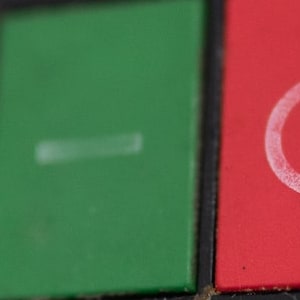on and off: Idiom Meaning and Origin
What does ‘on and off’ mean?
The idiom "on and off" means to do something intermittently or inconsistently, with periods of activity followed by periods of inactivity or cessation.

Idiom Explorer
The idiom "switch on" means to activate or turn on. It is used to describe the action of starting a device or making something operational.
The idiom "over and over again" means repeatedly doing or experiencing something.
The idiom "on the way" means that something is currently in progress or about to happen. It suggests that something is not yet completed or arrived, but is in the process of getting there.
The idiom "on the wane" means that something is declining or decreasing in strength, popularity, or influence. It describes a gradual and noticeable decline in a particular situation or condition.
The idiom "on the trot" is commonly used in both American and British English. It is believed to have originated from horse racing, where horses would trot during a race. The idiom has evolved to have different meanings and usage over time.
The idiom "on the run" means being in a state of constant movement or being pursued by someone or something. It can also refer to living a fast-paced and hectic life without any moment of rest or relaxation.
The idiom "on the go" means to be busy or occupied with various activities or tasks, without much time for rest or relaxation.
The idiom "on the fly" is a commonly used expression in the English language. It means doing something quickly or spontaneously without preparation or planning. The origin of the idiom is uncertain, but there are several theories about its roots.
The idiom "on the cusp" means being at the point of transition or change, often referring to being on the brink of something significant or experiencing a crucial moment where one thing ends and another begins.
The idiom "on the button" means to be exactly punctual or precise, often referring to an exact time or the right moment for something. It is used to indicate accuracy and timeliness.
Unveiling Intriguing Connotations
The idiomatic phrase "on and off" is used to indicate irregular or intermittent occurrences or actions. It implies that something is done or happens periodically, with breaks or interruptions in between.
The etymology of the idiom is rooted in the individual meanings of its constituent words. The word "on" signifies being engaged or in operation, while "off" indicates the opposite state of being discontinued or not active. When used together, "on and off" conveys the idea of alternating periods of engagement and disengagement.
The idiom "on and off" is commonly used in both informal and formal contexts. It is prevalent in everyday speech, written communication, and literature. Its versatility allows it to describe a wide range of circumstances or situations in which there is inconsistency or irregularity.
One of the most common examples of the use of this idiom is in reference to relationships. When someone says they have been dating someone "on and off," it indicates that the relationship has undergone multiple instances of starting and ending, with periods of separation interspersed with periods of rekindling. This can be likened to how a light bulb is turned on and off, now and then, indicating times of connection and disconnection.
Another area where the idiom is frequently applied is in describing actions or behavior. For instance, if someone states that they have been exercising "on and off," it suggests that their exercise routine has not been consistent and has involved periods of sporadic or interrupted activity. This is similar to how a light switch can be turned on an irregular basis, now and again, with moments of activity and inactivity.
The idiom "on and off" can also be employed to describe certain mental or emotional states. If someone says they have been feeling happy "on and off," it implies that their mood has been fluctuating, with moments of happiness followed by periods of sadness or indifference. This can be compared to how a light can be turned on and off, now and then, symbolizing shifts in emotional states.
Overall, the idiom "on and off" provides a concise and expressive way to convey the concept of irregularity or intermittence. It encapsulates the notion of actions or occurrences happening periodically, with breaks or interruptions in between. Its versatility allows it to be used in various contexts, making it a valuable and widely recognized phrase in the English language. So, whether someone is dating "on and off," exercising "on and off," or feeling happy "on and off," the idiom effectively conveys the idea of irregularity or intermittence in a friendly and conversational tone.
Example usage
Examples of how the idiom "on and off" can be used in a sentence:
- I've been working on this project on and off for the past few months.
- The rain continued on and off throughout the day.
- He has been switching jobs on and off for the last decade.
The idiom "on and off" is commonly used to describe intermittent or sporadic actions or occurrences. It suggests that something happens or is done periodically, with periods of time in between where it does not occur. The phrase can be used to indicate that an activity or event is not consistently continuous, but rather has interruptions or breaks. It can also imply a lack of commitment or stability in certain situations or behaviors. Overall, "on and off" conveys the idea of alternation or inconsistency in a specific context.
More "Temporal" idioms

